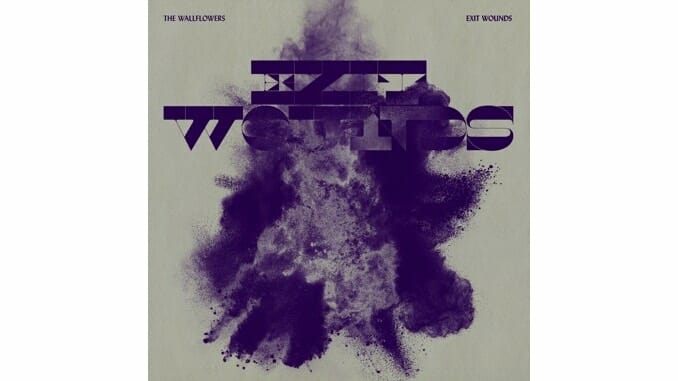The Wallflowers Stay the Course on Exit Wounds
Jakob Dylan and company have grown old comfortably, making solid but unexciting roots rock
Music Reviews The Wallflowers
It must be a little difficult to be a songwriter and also be the son of one of the best songwriters of all time, but Jakob Dylan has done what he can. In spite of the unavoidable comparisons to Bob Dylan, Jakob’s band The Wallflowers have created at least one perfect song in the past 30 years. It’s more than Sean Lennon has to show for himself. With a magical Tom Petty-esque groove and snarling electric guitar backing, “One Headlight” is the song in The Wallflowers’ catalogue that makes the case for just a smidge of nepotism.
Twenty-five years later, you’d be hard pressed to find a song that levels up to the organ-based groove of “One Headlight,” but there are parts of The Wallflowers’ new album that come close. Exit Wounds is Jakob Dylan’s first album since officially turning The Wallflowers into a solo project, but it’s also the strongest-sounding record he’s been involved with since 1996’s breakthrough, Bringing Down the Horse. His voice is still a mediocre rasp and his lyrics use clichés without blinking, but the songs on Exit Wounds are assembled with a newfound confidence that’s come with age.
While Jakob Dylan’s acoustic solo records, Seeing Things and Women + Country, came across half-heartedly, the refocus on roots rock suits Exit Wounds well. The sturdiest songs come in the first half, with the bluesy intro of “I Hear The Ocean (When I Wanna Hear Trains)” being an ideal example. Jakob comes across laid-back and comfortable here, but immediately drops a handful of equally forgettable and ridiculous lyrics. Take the line “I’m being handled like a pistol and a boy who plays / While lost in the saddle, two thousand miles out of range.” Jakob Dylan has never been the most distinguished songwriter, but he does sell his worst lines better than many poor lyricists can. And despite the clunky title, another early cut that stands out is “The Dive Bar in My Heart,” which features a sense of melancholy that hasn’t been found on a Wallflowers record in years.
“Maybe Your Heart’s Not In It No More” acts as a fine introduction to the record, but it also seems like Jakob Dylan wanted to get the most inherently Bob Dylan-esque song out of the way quickly. From the Blood on the Tracks-ian title to the descending chord progression that underlines the final line of the chorus, it’s one of the most appealing songs that Jakob has ever assembled. “Not a razor up to your throat, you can go anytime through any door, but maybe your heart’s not in it no more,” he sings, while touches of piano and organ make it his first real moment of sonic transcendence since 1996.
Things get stranger on the second half of Exit Wounds, particularly when Dylan moves away from the steady folk rock and towards some odd genre excursions. “Move The River” could be a forgotten Spoon B-side, since there’s something both funky and vague about the main guitar lick. By the time you notice the touches of auxiliary percussion, it’s obvious you’ve found the most generic indie-rock song of 2009. Even worse is the bar-band blues of “Who’s That Man Walking ‘Round My Garden,” which is complete with egregiously cheesy harmonies during the chorus and rollicking piano touches. It’s songs like these that make you thankful that Exit Wounds doesn’t have more stylistic experiments.
It’s clear that Exit Wounds has plenty going for it, but where it falters the most is with Butch Walker’s production. As an industry lifer who’s worked with everyone from Pink to Green Day, Walker’s production style is fundamentally mismatched to these songs, as he often makes albums sound the flattest they can. It’s especially apparent when it comes to Exit Wounds’s Americana textures, which have been buried in the mix and left to be ignored. Take the opening of “Roots and Wings,” a song that kicks off with a terrible electric guitar tone, a too-quiet mandolin, and a drum beat that sounds programmed on a Casio keyboard. It doesn’t get much better on the album’s ballads, where overly compressed vocals and harsh acoustic guitars reduce “Darlin’ Hold On” and “Wrong End of the Spear” to decidedly lackluster singer-songwriter material.
Still, “Roots and Wings” is a capital-G great song once you push past the weak opening. Dylan’s metaphors are clumsy, but he superbly walks the tightrope of sounding bitter without sounding unreasonable. “That’s my mojo you’re using, that’s my wine getting you drunk,” he sneers on the second verse, before hitting the chorus in stride. As a song, it makes the argument for Exit Wounds better than the album itself can: If we aren’t going to get much from Jakob Dylan anymore, at least we can get flashes of greatness.
Ethan Beck is a writer living in Pittsburgh. His work can be found at No Ripcord, Vice, Mic and others.